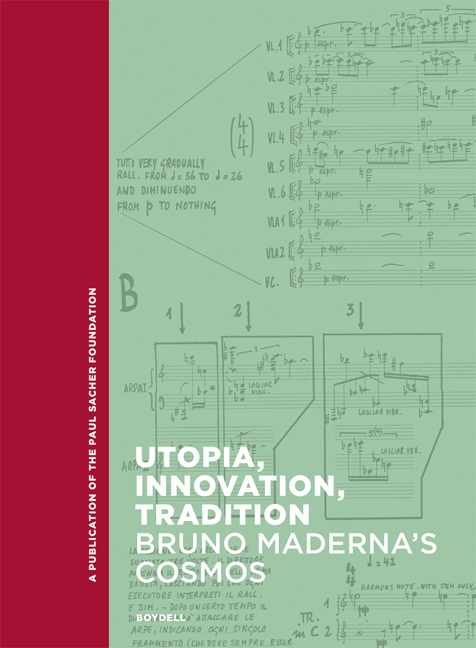Book contents
- Frontmatter
- Contents
- INTRODUCTION
- STAGING AND PERFORMING SOUNDS: A GLANCE THROUGH THE LAST THEATRICAL WORK
- BUILDING SOUNDS: THE COMPOSER
- CREATING SOUND: THE MUSIC BEYOND/WITHOUT THE STAGE
- REINVENTING SOUNDS: DIALOGUES WITH MUSIC OF EVERY EPOCH AND STYLE
- ACROSS BORDERS: THE CONDUCTOR AND THE INTERPRETER
- SEARCHING FOR ROOTS: THE DEVELOPMENT OF A STYLE
- STAGING AND PERFORMING TEXTS: A GLANCE THROUGH EARLY DRAMATURGICAL AND VOCAL WORKS
- Chronology Of Bruno Maderna’s Works
- Selected Bibliography
- Index
Maderna and the Poets, 1938–48
Published online by Cambridge University Press: 17 January 2024
- Frontmatter
- Contents
- INTRODUCTION
- STAGING AND PERFORMING SOUNDS: A GLANCE THROUGH THE LAST THEATRICAL WORK
- BUILDING SOUNDS: THE COMPOSER
- CREATING SOUND: THE MUSIC BEYOND/WITHOUT THE STAGE
- REINVENTING SOUNDS: DIALOGUES WITH MUSIC OF EVERY EPOCH AND STYLE
- ACROSS BORDERS: THE CONDUCTOR AND THE INTERPRETER
- SEARCHING FOR ROOTS: THE DEVELOPMENT OF A STYLE
- STAGING AND PERFORMING TEXTS: A GLANCE THROUGH EARLY DRAMATURGICAL AND VOCAL WORKS
- Chronology Of Bruno Maderna’s Works
- Selected Bibliography
- Index
Summary
Gabriele D’Annunzio (La sera fiesolana)
The diary entry for 8 March 1938 of a seventeen-year-old student at Rome's Santa Cecilia Academy reads:
Gabriele D’Annunzio died suddenly on 3 [sic] March. It is undoubtable that with him Italy has lost a great poet. But for me he had already died at least fifteen years ago. Indeed, it is hard to think of his recent production without feeling a certain sense of pity.
He had now become a total wreck. Apart from him being well into his dotage, deranged, and displaying such childish behavior, it must be said, and this had been going on for a long time, that he was now one of those characters who belonged to a world which, in our experience, in our evolution that took place straight after the war, could be said to have disappeared. A “fish out of water.”
However, there is always his work which, one must admit, bears witness to a great poet and, in my opinion, at least a third of this will remain, uncontaminated by the passing of time, uncontaminated in the admiration of posterity.
In my opinion, he will still have the well-earned right to be the third alongside Carducci and Pascoli and to be represented with them, as indeed is consistent with facts, in the compendiums of literature, as the last wonderful bud and the last meaningful fruit of our glorious literature.
Maderna was not alone in reacting in this way toward D’Annunzio and his myth, and shared this revulsion for the commemoration of the “poet-soldier” with other more direct and authoritative literary voices. In stating that the poet had “already died at least fifteen years ago,” Maderna was blue-pencilling the poet's entire period of exile in the Vittoriale degli Italiani (1921–38) and therefore implicitly also deleting the Libro Segreto, despite its abundance of literary gems and even premonitory visions. Instead, he assigned “at least one third” of the literary work of “a great poet” to history, and such a verdict presumably originated from his studies and the environment he frequented. The concluding remarks, referring to Carducci, Pascoli, and D’Annunzio as the three crowns of Italian poetry, is indeed a superficial commonplace in line with national propaganda.
- Type
- Chapter
- Information
- Utopia, Innovation, TraditionBruno Maderna's Cosmos, pp. 415 - 442Publisher: Boydell & BrewerPrint publication year: 2023

